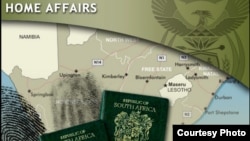WASHINGTON —
Zimbabweans living in South Africa say they are worried by the Jacob Zuma administration’s moves to ban foreigners who overstay in that country for periods ranging from one to five years.
Reacting to reports that the South African government has since introduced these stringent measures, Zimbabweans who spoke to Studio 7 said they will soon be approaching the Zuma government to seek the relaxation of the new regulations.
Home Affairs officials were not reachable for comment as they were said to be attending crucial meetings with newly appointed minister, Malusi Gigaba, who replaced Naledi Pandor following South Africa’s recent general election.
Daniel Muzenda of the Zimbabwe Migrants Association says the new regulations will affect millions of Zimbabweans as their relatives and friends normally work in that country with expired immigration papers.
Muzenda says South Africa has in the past been deporting Zimbabweans with expired travel documents, and as a result, banning them will also be devastating to economic refugees.
According to NewsDay newspaper, first-time offenders, who overstay for less than 30 days, would be banned from entering South Africa for one year while second-time offenders, who overstay by the same period, get a two-year ban. Those that overstay for a period exceeding 30 days are banned for five years.
The Department of Home Affairs recently said most permits issued to Zimbabweans will expire in December 2014.
“In this context, Cabinet approved the approach on the expiry of permits issued under the Special Dispensation for Zimbabweans in terms of which permit-holders will be expected to re-apply for permits. As per Cabinet decision, the Minister of Home Affairs will in due course provide more clarity on the process to be followed and the date of commencement. It is not South Africa’s intention to reverse the benefits of the dispensation.”
The special dispensation allowed close to 250,000 Zimbabwean nationals to be regularized through South Africa’s permitting regime. It enhanced national security and the management of migration and helped to mitigate widespread abuse of Zimbabweans illegally in the country, by corrupt employers and officials.
The department said it will continue to combat illegal migration, crime, fraud and corruption. “It is committed to providing a secured civic and immigration service ensuring all people in the country are safe.”
Reacting to reports that the South African government has since introduced these stringent measures, Zimbabweans who spoke to Studio 7 said they will soon be approaching the Zuma government to seek the relaxation of the new regulations.
Home Affairs officials were not reachable for comment as they were said to be attending crucial meetings with newly appointed minister, Malusi Gigaba, who replaced Naledi Pandor following South Africa’s recent general election.
Daniel Muzenda of the Zimbabwe Migrants Association says the new regulations will affect millions of Zimbabweans as their relatives and friends normally work in that country with expired immigration papers.
Muzenda says South Africa has in the past been deporting Zimbabweans with expired travel documents, and as a result, banning them will also be devastating to economic refugees.
According to NewsDay newspaper, first-time offenders, who overstay for less than 30 days, would be banned from entering South Africa for one year while second-time offenders, who overstay by the same period, get a two-year ban. Those that overstay for a period exceeding 30 days are banned for five years.
The Department of Home Affairs recently said most permits issued to Zimbabweans will expire in December 2014.
“In this context, Cabinet approved the approach on the expiry of permits issued under the Special Dispensation for Zimbabweans in terms of which permit-holders will be expected to re-apply for permits. As per Cabinet decision, the Minister of Home Affairs will in due course provide more clarity on the process to be followed and the date of commencement. It is not South Africa’s intention to reverse the benefits of the dispensation.”
The special dispensation allowed close to 250,000 Zimbabwean nationals to be regularized through South Africa’s permitting regime. It enhanced national security and the management of migration and helped to mitigate widespread abuse of Zimbabweans illegally in the country, by corrupt employers and officials.
The department said it will continue to combat illegal migration, crime, fraud and corruption. “It is committed to providing a secured civic and immigration service ensuring all people in the country are safe.”




